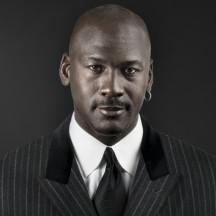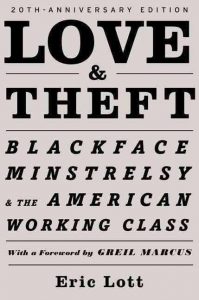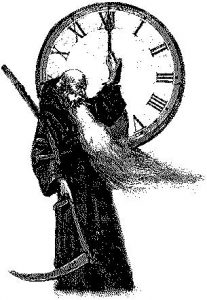Chronocentrism, it is called; the very human phenomenon in which one believes to be living in an exceptional time. With politicians it is a chronic ailment; they refer to ‘these difficult times’ in every discussion, or ‘these uncertain times’, and variants.
But intellectuals also fall for it. Respected Dutch philosopher Joke Hermsen meets broad agreement with her writing “Quiet Down The Time” in which she notes how busy, busy, busy we are and that we have less and less time at our disposal – also an idée fixe that we have been telling ourselves for centuries. In every era, opinion formers and trendsetters sigh that we live in weird times, in troubled times, that time flies and that times are hard.
In 63 BC Cicero complained about the corruption and the badness of modern times with the famous exclamation O tempora, o mores, (which deplores customs and corruption of his time) but in the centuries after him none of these mores seem to be time-bound.
Goethe hits the nail on the head in Faust (1808). The great poet-thinker is annoyed by his valued colleague and former teacher Johann Gottfried Herder, who has just coined the term Zeitgeist, and replies through the old scholar Faust. Faust knocks some sense into his assistant Wagner when he starts twaddling about the Zeitgeist, the ‘Spirit Of Ages”:
Was ihr den Geist der Zeiten heißt,
Das ist im Grund der Herren eigner Geist,
In dem die Zeiten sich bespiegeln.
“What you the Spirit of the Ages call / Is nothing but the spirit of you all / Wherein the Ages are reflected.”
Dylan follows Goethe and does not share the short-sighted view that we helplessly float along on the waves of an autonomous time. We ourselves will change times, he argues in ’63, in “The Times They Are A-Changin’” the song that so calmly echoes in “Things Have Changed“. In later songs, the narrator withholds commentary on chronocentric narrow-mindedness. The exhausted Ruby in “New Brownsvile Girl” may be sighing how hard the times are, but the narrator does not participate. We live in times where one commits crimes.
Thus “Political World” is a despondent observation of a cynical narrator who sees that neither the times nor the people are essentially changing, and in “Floater” (2001) the poet has reached the maturity to conclude:
They say times are hard, if you do not believe it
You can just follow your nose
It does not bother me - times are hard everywhere.
It is a beautiful, resigned aphorism from a beautiful, enigmatic song, but it comes shortly after the one time that Dylan blames the times for his detachment, a year earlier in his Oscar winning masterpiece “Things Have Changed”. The wandering, lost protagonist has to give up, but that is not his fault: no, the people are crazy and they are strange times.
It is a state of being in which Dylan’s protagonists often find themselves, the lost, dream-like and passive state of detachment. We recognise it from Tom Thumb, from the young man who longs for Johanna, the drifter who escapes, the I-persons in “Watching The River Flow”, “Going Going Gone” and “Simple Twist Of Fate”, the interlocutor of Señor – and the list goes on through “Mississippi” and “Things Have Changed” until well into the twenty-first century. Just like “Just Like Tom Thumb’s Blues” most of those songs have an epic quality, they tell (snippets of) a story. Here it hardly does. “Things Have Changed” is mainly lyrical, expresses in unrelenting, poetic images the discomfort of a displaced, numb narrator, through which the poet strings mysterious observations and half-known references.
The first verse starts as a classic novella, with the introduction of the protagonist, but it is confusing right away. He is worried, has nothing to gain, nor to lose. Admittedly, he only has to lift a finger for sensory pleasure, but apparently he does not care anymore. For the description of his appearance the narrator confines himself to two characteristics: he is white and has the eyes of  an assassin. That alone is already intriguing. This metaphor is usually reserved for sports heroes. According to his biographer, basketball legend Michael Jordan has “the gaze of an assassin” and in the summer of 2015 football coach Steve McLaren of Newcastle United introduces his new purchase Aleksandar Mitrovic to the press: “He’s got assassin’s eyes.” With only eight goals from Mitrovic in thirty games, the club were relegated in May 2016, so that was a bit disappointing.
an assassin. That alone is already intriguing. This metaphor is usually reserved for sports heroes. According to his biographer, basketball legend Michael Jordan has “the gaze of an assassin” and in the summer of 2015 football coach Steve McLaren of Newcastle United introduces his new purchase Aleksandar Mitrovic to the press: “He’s got assassin’s eyes.” With only eight goals from Mitrovic in thirty games, the club were relegated in May 2016, so that was a bit disappointing.
Dylan’s main character is probably not a sports hero, but he certainly is a man with a mysterious aura. He has not an open, honest gaze, at any rate, and resembles the man Angelina is looking for (““his eyes were two slits that would make a snake proud”“) and also the Satan from “Man Of Peace” (“both eyes are looking like they’re on a rabbit hunt, nobody can see through him“) or, on the opposite, the God from “Durango” (“with His serpent eyes of obsidian“). But perhaps Dylan just looked in the mirror.
 The film for which Dylan writes the song, Wonder Boys by director Curtis Hanson, appears incidentally, in the second verse, and then only indirectly. So indirectly that it could also be about another (film) character: Blanche DuBois from A Streetcar Named Desire (Elia Kazan, 1951) in particular. The closing words do not get up to gentlemen, I’m only passing through are lifted from her closing monologue, when the men in the white coats drag the now completely empty Blanche into the institution.
The film for which Dylan writes the song, Wonder Boys by director Curtis Hanson, appears incidentally, in the second verse, and then only indirectly. So indirectly that it could also be about another (film) character: Blanche DuBois from A Streetcar Named Desire (Elia Kazan, 1951) in particular. The closing words do not get up to gentlemen, I’m only passing through are lifted from her closing monologue, when the men in the white coats drag the now completely empty Blanche into the institution.
With some effort, there are some similarities to the target film to be found in the lyrics, but the concerns of the drudging professor Grady Tripp (played by Michael Douglas) will not have been much more than a superficial source of inspiration. This is also evident from the words of gratitude that Dylan expresses at the Oscar presentation: “A song that doesn’t pussyfoot around nor turn a blind eye to human nature.” Dylanesque nebula, again.
The lyrics are full of concealing language use (“some things”, “so much”, “things”, “lot of other stuff” and so on) and dark imagery. “I’ve been walking forty miles of bad road” (Dylan writes in the fortieth year after his first record). He feels like he wants to put a beautiful lady in a wheelbarrow (?). “The next sixty seconds could be like an eternity” (sings the singer exactly sixty seconds before the end of the song). And the ultimate enigmatic sentence of the last middle-eight, about one Mr. Jinx and Miss Lucy jumping into a lake. Mr. Jinks is the cat in the cartoon series Pixie and Dixie, the beagle that Dylan buys during the Rolling Thunder tour, he calls Miss Lucy. Those facts do not help.
 A jinx is a kind of curse that lays a constant stream of small accidents and bad luck on the accursed, or the name for a person who brings bad luck – that fits better. And Miss Lucy? Dylan knows Miss Lucy from the song “Miss Lucy Long”, a song from the nineteenth century that is sung in the blackface minstrel shows and is analyzed by Eric Lott in his “Love & Theft”, in the work that is on Dylan’s bedside table in this period. This Lucy does not jump in the lake, but still times do change for her. She has a big mouth and is therefore exchanged for a bag of corn.
A jinx is a kind of curse that lays a constant stream of small accidents and bad luck on the accursed, or the name for a person who brings bad luck – that fits better. And Miss Lucy? Dylan knows Miss Lucy from the song “Miss Lucy Long”, a song from the nineteenth century that is sung in the blackface minstrel shows and is analyzed by Eric Lott in his “Love & Theft”, in the work that is on Dylan’s bedside table in this period. This Lucy does not jump in the lake, but still times do change for her. She has a big mouth and is therefore exchanged for a bag of corn.
Explicable or not, even the impenetrable verses contribute to that one image that rises from the song: the evening twilight of a extinguished human life that Dylan painted in a similarly large way in that other monument, in “Not Dark Yet”.
Imagery like ‘waiting on the last train‘ and ‘head already in the noose‘ is not necessarily overwhelming, but effective. Distinctive, however, are the philosophical one-liners. ‘All the truth in the world adds up to one big lie’ has the same dark, sombre beauty as ‘my sense of humanity has gone down the drain’ from “Not Dark Yet”, like the masterly, melancholy phrase ‘I used to care, but things have changed’ is an echo of ‘I just do not see why I should even care’ from that same song.
The lament is accompanied by a driving, almost swinging music part with a high hum-along quality. Unusual for Dylan are the many middle-eights; the master lets the bridge play no fewer than four times. It is not annoying, for it is indeed a beautiful bridge, as the whole song is captivating. “Things Have Changed” is already in Olof Bjorner’s Top 20 of most performed songs – with over eight hundred performances a proud Dylan has already played it more often than “The Times They Are A-Changin”.
There are not that many noteworthy covers, but among those few attempts some pearls shine. Most colleagues extrapolate the jazzy elements of the original, with walking bass and brushes, and opt for the wandering pace that Dylan already has abandoned in his live performances. Usually one enters J.J. Cale’s territory.
That applies in any case to the beautiful version by late bloomer Grant Peeples, on Prior Convictions from 2012. Pure swing jazz produces the hobbyproject String Swing from Swedish jazz singer Josefine Cronholm (Waiting for the Good Times, 2008, with a magisterial guitar solo á la Wes Montgomery), but Cronholm does not come close to her superior colleague Barb Jungr. Jungr continues tirelessly to play the Bob Dylan Songbook to this day and is still getting better every day. Her version of “Things Have Changed”, which was recorded in 2002, is fascinating, and distinctive too: Jungr turns it into a tango.
However, the ladies competition is decided by veteran Bettye LaVette. LaVette’s soulful cover opens the 2018 tribute album Things Have Changed is rough, driving and swings like a pendulum.
 The most beautiful cover so far is sung by another jazz celebrity, by Curtis Stigers. His Don’t Think Twice from 2003 is one of the most brilliant renditions of that evergreen, and with “Things Have Changed” (Let’s Go Out Tonight, 2012) he reconfirms his class. Superb, supercooled production with dozens of small, loving surprises in the arrangement, and on top of that the declamatory art of Stigers; it is a version that earns a place next to the original.
The most beautiful cover so far is sung by another jazz celebrity, by Curtis Stigers. His Don’t Think Twice from 2003 is one of the most brilliant renditions of that evergreen, and with “Things Have Changed” (Let’s Go Out Tonight, 2012) he reconfirms his class. Superb, supercooled production with dozens of small, loving surprises in the arrangement, and on top of that the declamatory art of Stigers; it is a version that earns a place next to the original.
Curtis Stigers:
- Dylan: Things have changed, or have they?
- Things have changed: the meanings behind Bob Dylan’s song
- Bob Dylan’s ultimate message: there is nothing you can do, nothing will be changed.
- Bob Dylan in 1998/9: the road to the Oscar
What else is on the site?
You’ll find an index to our latest posts arranged by themes and subjects on the home page. You can also see details of our main sections on this site at the top of this page under the picture.
The index to the 500+ songs reviewed is now on a new page of its own. You will find it here. It contains reviews of every Dylan composition that we can find a recording of – if you know of anything we have missed please do write in.
We also now have a discussion group “Untold Dylan” on Facebook. Just type the phrase “Untold Dylan” in, on your Facebook page or follow this link
And please do note The Bob Dylan Project, which lists every Dylan song in alphabetical order, and has links to licensed recordings and performances by Dylan and by other artists, is starting to link back to our reviews.


Excellent review, thought provoking!
Sam Spade (Humphrey Bogart): “And the only chance I’ve got ….is by staying as far away as possible from you and the police because you’d only gum up the works”(Maltese Falcon)
I’ve been trying to get as far away from myself as I can
Some things are too hot to touch (Bob Dylan: Things Have Changed)
“They caught the last train for the coast” (American Pie)
We are actively promoting a link to this interesting topic on The Bob Dylan Project at:
https://thebobdylanproject.com/Song/id/665/Things-Have-Changed
If you are interested, we are a portal to all the great information related to this topic.
Join us inside Bob Dylan’s Music Box.